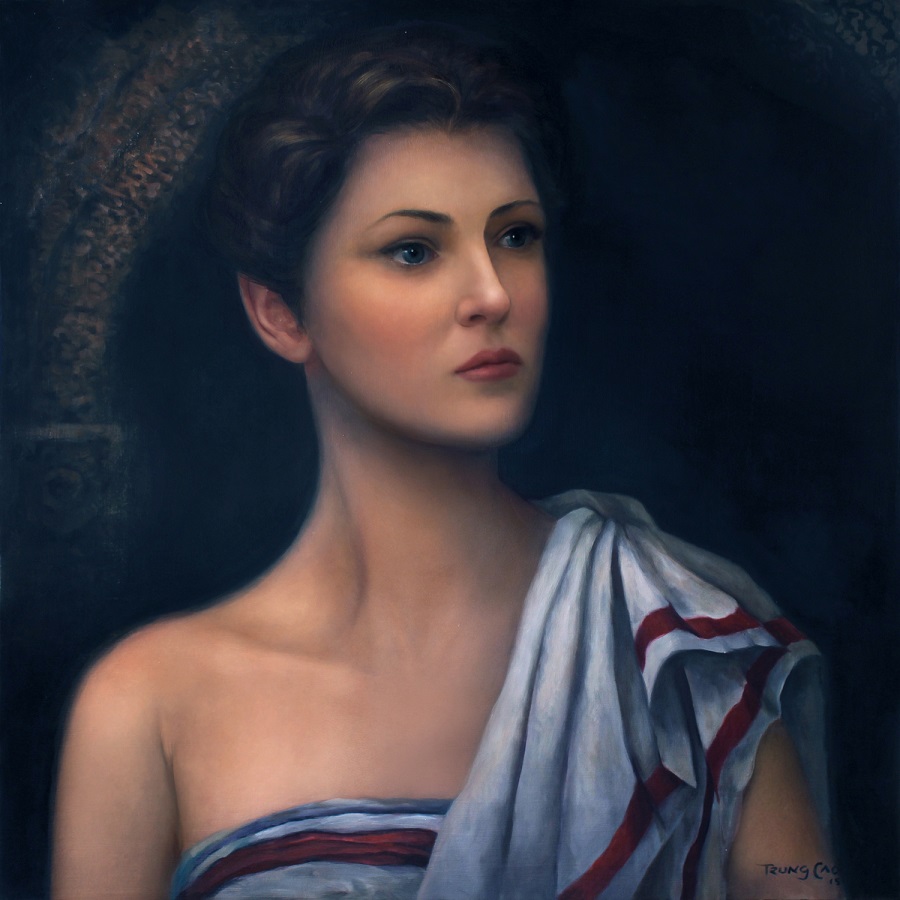Penelope
READ MORE HERE:
ODYSSEUS
THE SUITORS OF PENELOPE
In Homer's Odyssey, Penelope (Ancient Greek: Πηνελόπεια or Πηνελόπη) is the wife of Odysseus, who is known for her fidelity to Odysseus while he was absent, despite having many suitors.
Her name has therefore been traditionally associated with marital fidelity.
"Wife, one thing is certain—not all our soldiers will return from Troy unhurt … So I cannot say whether the gods will let me come back or whether I shall fall on Trojan soil. But I leave everything here in your charge. Look after my father and mother in the house as you do now … And when you see a beard on our boy's chin, marry whomsoever you fancy and leave your home."
(Odysseus to Penelope, Homer, Odyssey 18.260).
"… In that catastrophe no one was dealt a heavier blow than I, who pass my days in mourning for the best of husbands …"
(Penelope to the minstrel Phemius, Homer, Odyssey 1.340).
"Penelope must beware of trying our young men's patience much further and counting too much on the matchless gifts that she owes to Athena, her skill in fine handicraft, her excellent brain, and that genius she has for getting her way. In that respect, I grant, she has no equal, not even in story."
(The Suitor Antinous to Telemachus. Homer, Odyssey 2.115).
"Penelope is meaner to look upon than you in comeliness and in stature, for she is a mortal, while you are immortal and ageless. But even so I wish and long day by day to reach my home, and to see the day of my return."
(Odysseus to Calypso. Homer, Odyssey 5.215).
Mythology
Penelope waited two decades for her husband Odysseus to return to Ithaca from the Trojan War, not knowing whether he was dead or alive. In this long and painful wait her sole relief was to weep and sigh all day long, and to lie in what she called her "bed of sorrows" which she watered with tears until she fell asleep.
In the meantime, she was compelled to promise the scoundrels that called themselves her Suitors and who were at the same time the pick of the Ithacan nobility, that she would wed one of them when the shroud of Laertes was finished. She wove it for three years, weaving it by day and undoing it by night. But her trick was discovered and her life became even more difficult.
Her husband was one of the Suitors of Helen
Odysseus was among those who came to Sparta in order to compete for the hand of Helen, that jewel of Hellas who was afterwards called "Lady of Sorrows" because so many a man lost his life fighting for her sake in the plains of Troy . And yet, some say, this was the will of the gods. Helen's beauty was such that her earthly father Tyndareus (for the heavenly was Zeus) feared that war would break up among the many princes who had come from the whole of Hellas hoping to marry her.
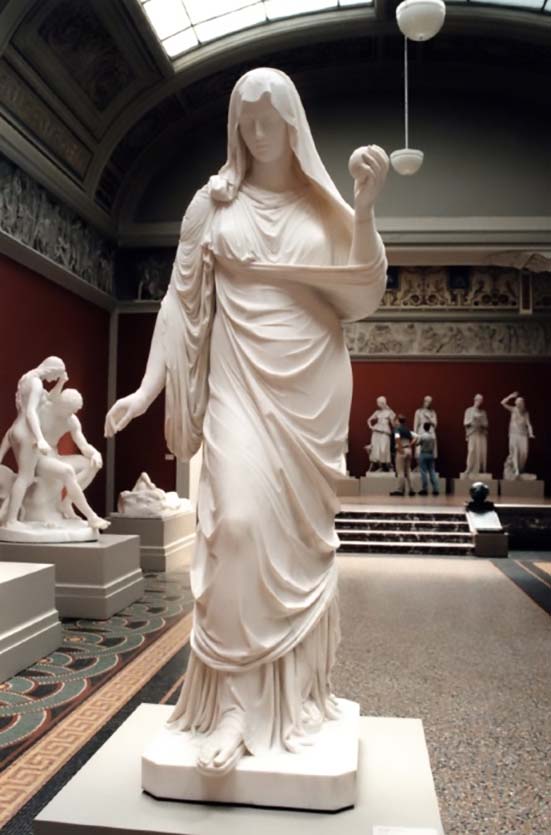
The Oath of Tyndareus
It was then that Odysseus told King Tyndareus to exact an oath from all the Suitors of Helen that they would defend the favored bridegroom against any wrong that might be done against him in respect of his marriage. Tyndareus did as Odysseus advised, and having thus united the contenders by forcing them to leave their honour as a pledge, he, in exchange for Odysseus' invaluable service, helped him to win the hand of Tyndareus' niece Penelope.
Some consequences of the Oath
This is what is called The Oath of Tyndareus. Thanks to this oath peace was preserved among the Suitors of Helen, when Helen was given to Menelaus, and thanks to it Odysseus married Penelope. But later, on account of the same oath, all princes of Hellas had to go to war against Troy, where Helen was kept, now married to the seducer Paris, who had come to Sparta and abducted her. And the same oath by which Odysseus won his wife, forced him later to part from his prize for twenty years, and live, against his will, the life of a soldier and adventurer.
Does not wish to leave kingdom and queen
Now, Odysseus, who was the king of beautiful isles and the husband of a loving queen, not wishing to waste his life in wars and fights, decided to feign madness instead of honouring The Oath of Tyndareus, and thereby join the alliance that was determined to sail against Troy in order to demand, either by persuasion or by force, the restoration of Helen and the property.
Palamedes destroys Odysseus' home life
And so, playing the fool, Odysseus put on a cap and yoked a horse and an ox to the plow. But Palamedes, who had come to Ithaca with Nestor and Menelaus in order to remind the king of his oath, snatched little Telemachus from Penelope's bosom, or as others say, from the cradle, and put him in front of the plow, forcing Odysseus to give up his pretense.
Others have said that Palamedes threatened the child with his own sword, but in any case Odysseus was outwitted and had to join the alliance. However, clever Palamedes later paid with his own death for having spoiled Odysseus' sweet home life.
Odysseus won Penelope in a foot-race
Others affirm that Odysseus won Penelope in a foot-race for her wooers, organized by Icarius. And they say that when he gave his daughter in marriage to Odysseus, he tried to make him settle in Lacedaemon. However, Odysseus refused, and he could not persuade Penelope either. So when the newly-weds set forth to Ithaca, the king followed the chariot begging her to stay.
After some time, they say, Odysseus, not being able to endure any longer this expression of fatherly love and devotion, bade Penelope either to come with him willingly, or else go back with her father to Lacedaemon, if she preferred to do so. They say that Penelope did not reply, but instead covered her face with a veil, and by that sign they both understood that she wished to depart with her husband.
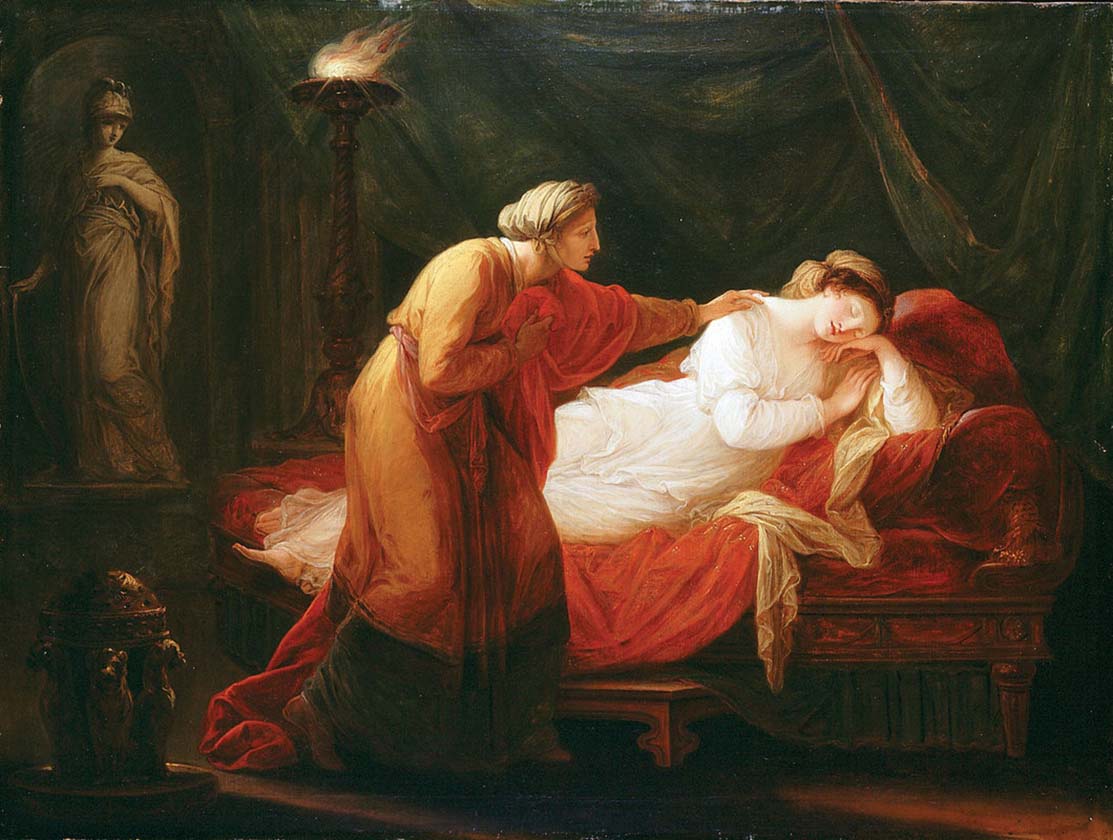
Queen of Ithaca, Cephallenia and other islands
This is how Penelope came to Ithaca where she became queen of that island as well as others that are in the Ionian Sea off the coast of Acarnania, among which is the larger island Cephallenia, called after Cephalus, father by Procris of Arcisius, father of Laertes, father of Odysseus.
Cephalus was an Athenian, but he came to that region when he assisted Amphitryon in his campaign against the islands that were ruled from Taphos.
The Suitors of Penelope (see further below for a more detailed description)
Penelope and Odysseus had spent together about a decade when the Trojan War broke up and Odysseus left. The war itself lasted ten years, but when it was over and nothing was known of him, a group of scoundrels known as the Suitors of Penelope came to the palace wishing to marry the queen.
The Shroud of Laertes (Penelope's web)
Penelope fooled them several years, declaring that she would marry one of them once she had completed the shroud of Laertes, for as she said:
"When he succumbs to the dread hand of Death that stretches all men out at last, I must not risk the scandal there would be among my countrywomen here if one who had amassed such wealth were put to rest without a shroud." (Penelope to the Suitors. Homer, Odyssey 2.100).
However, Penelope had no intention of ever finishing her work, and so what she wove during the day, she unravelled by night.
The Suitors' pleasant life
But when one of Penelope's maids gave her mistress away, the Suitors, having caught the queen destroying her work, forced her to complete it. And so, realising that they had been fooled by her in the course of several years, the Suitors decided that for as long as she maintained her attitude, they would continue to feast in the palace at the palace's expenses.
Otherwise they used to amuse themselves in a free and easy way outside the palace with quoits and javelin-throwing, a nice and entertaining activity which they could consent to interrupt when supper was ready. Their banquets were prepared by slaughtering sheep, goats, hogs, and heifers from Odysseus' herd. And since banquets and music go together, there was always someone playing the lyre. Such was the pleasant life, free of charge, that the Suitors led at Odysseus' palace.
Plot against Penelope's son
This was the situation when Penelope's son Telemachus sailed to Pylos and Sparta in order to meet Nestor and Menelaus, with the hope of having news of his father. But when the Suitors learned that the lad had determination enough to launch a ship and choose the best men in the land for the crew without saying a word to them, they, fearing that Telemachus would become their bane, planned to slay him on his homeward way.
Herald overhears the Suitors
When Penelope learned about the conspiracy through the herald Medon, who overheard the Suitors, she could not stop lamenting, seeing that the loss of her child was about to be added to the loss of her husband. And so she lay in her chamber, touching no food, and pondering whether her son would escape death, or be slain by the Suitors.
Penelope's sister appears in her dreams
And nothing could soothe her but Sleep. For sometimes gods talk to mortals during sleep, clear visions coming in the darkness of Night, and Sleep himself being a god. So Athena fashioned a phantom of Penelope's sister Iphthime, and sent it to talk to her at the gates of dreams, and bid her cease from weeping and lamentation; for Telemachus, said the phantom, was led by Athena herself.
Penelope's sister Iphthime married Eumelus, who led the Pheraeans against Troy and was the son of Admetus and Alcestis, the woman who died for love in her husband's place.
Harsh rebuke against the suitor Antinous
In fact Telemachus escaped the Suitors' plot, and when Penelope learned what had happened, she harshly rebuked the main instigator Antinous:
"I denounce you for the double-dealing ruffian that you are. Madman! How dare you plot against Telemachus' life." (Penelope to Antinous. Homer, Odyssey 16.419).
Penelope then reproached Antinous, reminding him how his father had been once saved from an angry mob by Odysseus, at whose expense he was now living free of charge, whose wife he was courting, and whose son he proposed to kill, disregarding the grief he may cause to herself.
Condemns their style
And on a later occasion, she told the Suitors that even if the day approached when she would have to remarry, she nevertheless condemned the way in which they conducted their suit, saying:
"Surely it is usual for the Suitors to bring in their own cattle and sheep to make a banquet for the lady's friends, and also to give her valuable presents, but not to enjoy free meals at someone else's expense." (Penelope to the Suitors. Homer, Odyssey 18.275).
But the Suitors, not trusting her words after what had happened with the shroud of Laertes, would not leave the palace nor abstain from conducting the suit with such a remarkable style.
Without defence
For, as Penelope herself pointed out, there was no chieftain from the surrounding islands and from Ithaca itself that was not forcing himself into her house, plundering it. And that is why Penelope could not feel but despair and neglect, passing her days in sobs and tears for having lost her husband and the protection of the household.
The Cat and the Mice
This invasion of Odysseus' home, which, like a revolution, tended to seize all instruments for the control of riches and power, came to an end when the master of the house returned. For, as even children know, the mice can only play while the cat is away.
On his arrival to Ithaca, Athena disguised Odysseus as a stranger and a beggar, withering his limbs, robbing his head of hair, and covering his body with the wrinkles of Old Age. He then came to Eumaeus, his former servant and swineherd, and learned from him the state of affairs in his home. And having met Telemachus in the hut of Eumaeus, he made a plan together with him.
Odysseus in the palace
Still looking as a distressful beggar, limping along with the aid of his staff, Odysseus came to the palace, where only his old dog recognized him, dying immediately after having seen his master in the twentieth year. There he came into conflict with Antinous, who was irritated at the beggar, and dealt him a blow.
Penelope talks to the stranger
But Penelope sent for the beggar; for such a stranger who seemed to have traveled far, she thought, might have heard of her husband. And not recognizing Odysseus, but being impressed by the stranger, she told him the whole story of her misery, how she had fooled the Suitors with the web, how they loaded her with reproaches on discovering her trick, and how now she would be forced by time and circumstances to take the sad step of marrying one of the scoundrels.
The stranger's prophecy
When the turn came to Odysseus-the-beggar to tell his own story to the lady of the house, he, not wishing her to know his identity yet, fabricated a tale about how he had met Odysseus, giving proof, through many details, of his truthfulness. For he could describe Odysseus' cloak and the golden broch that it displayed along with other details. But seeing that his descriptions made Penelope even more disposed to weep, he said:
"… Dry your tears now and hear what I have to say … I have news of Odysseus' return, that he is alive and near …" (Odysseus to Penelope. Homer, Odyssey 19.269).
And after inventing other details which made the story credible he finally declared:
"So you see that he is safe and will soon be back. Indeed he is very close … I swear first by Zeus, the best and greatest of the gods, and then by the good Odysseus' hearth which I have come to, that everything will happen as I foretell. This very year Odysseus will be here, between the waning of the old moon and the waxing of the new." (Odysseus to Penelope. Homer, Odyssey 19.300).
Penelope enchanted
Even if Penelope, having deep despair in her soul, could not believe in such prophecies, she was enchanted by the stranger, and ordered the maids to wash the visitor's feet, spread a bed for him, and the next morning give him a bath and rub him with oil, so that he would be ready to eat breakfast with Telemachus in the palace's hall.
Euryclia recognizes Odysseus
It was then that Euryclia, the servant whom Laertes had procured for the price of twenty oxen, and who had been the nurse of both Odysseus and Telemachus, was appointed to wash the visitor's feet.
Now Odysseus had an old scar just above the knee, and when the old woman passed her hands over the scar, she recognized the feel of it at once, and knew that this stranger was indeed Odysseus. However, he ordered her to keep silent.
Aspects of recognition
After Odysseus bathed his feet, Penelope addressed him once more, still without recognizing him, which may seem an amazing circumstance. For, despite the fact that Athena had changed his appearance, some may ask why it should be easier to identify a scar rather than a face, or the eyes in that face, or a familiar voice.
But these things, being matter of opinion, may cause endless debate, as if one were to wonder why Penelope, being herself what is called "a myth," quotes freely from other "myths" in her conversation.
Tells her dream to the stranger
Penelope then, addressed Odysseus once more after Euryclia had bathed his feet. And as if she wished to make intimate acquaintance with him, she asked him to interpret a dream of hers in which she had seen herself keeping a flock of twenty geese. And while she was with the geese, she saw an eagle swoop down from the hills and break their necks.
Then, Penelope said, she wept and cried aloud. But the eagle came back calling itself Penelope's husband; and comparing the geese to the Suitors, the eagle told her to take heart, for they would be punished at Odysseus' soon homecoming.
What Penelope knows about dreams
And here again some could ask what need did Penelope have of hearing the stranger's interpretation of such an obvious dream, on which, as Odysseus himself points out, no other meaning could be forced different from the one expressed by the eagle in the dream itself. But Penelope knew better.
For she explained to Odysseus the true nature of dreams, and how there are two gates through which dreams reach mortals; and one, she said, is made of horn and the other of ivory. And the dreams that come through the ivory gate cheat us with empty promises, whereas those that pass through the gate of horn tell the dreamer the truth of what will happen. Yet she could not tell from which source her dream took wing.
Penelope comments practical issues
Having shared with the stranger these ideas, showing to him her open disposition—for dreams are not usually told to those who do not seem to deserve confidence—Penelope commented practical issues. She said that her son Telemachus actually desired her to remarry, for otherwise the Suitors would eat up his estate, and that she now was about to propose a trial of strength, and that she was prepared to marry whichever among the Suitors proved the best at stringing the bow and shooting an arrow.
The Suitors suddenly shot
So it was done. Penelope delivered to her Suitors the bow of Odysseus, saying that she would marry him who bent the bow. And when none of them could bend it, Odysseus took it and shot down the Suitors during a great battle in the hall of the palace. This is how the husband, who had been absent nineteen years, won his wife for a second time while she slept in her chamber upstairs.
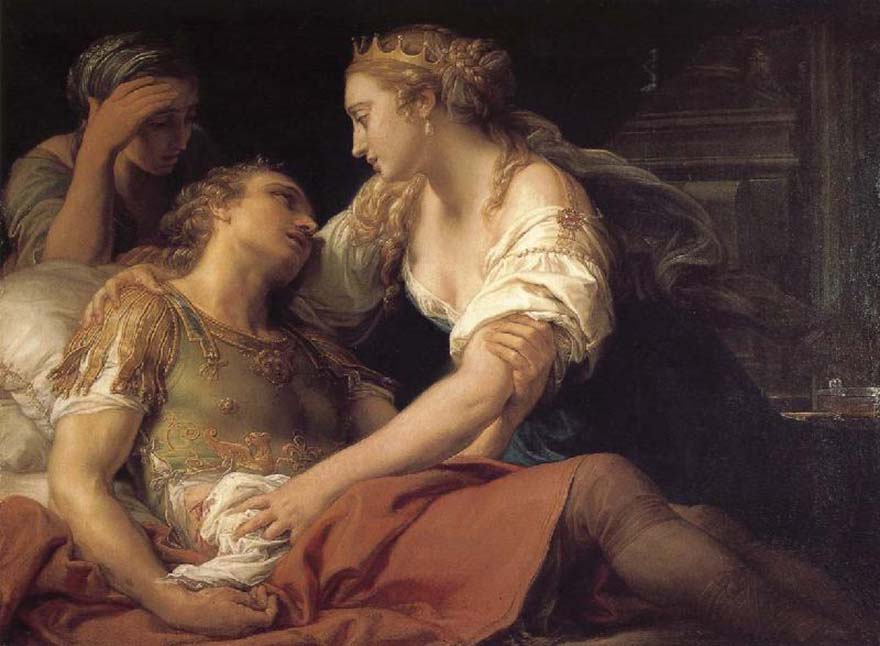
Penelope wakes up to a new world
When the massacre was completed, Euryclia, following Odysseus' instructions, woke up Penelope with incredible words:
"Wake up, Penelope, dear child, and see a sight you have longed for all these many days. Odysseus has come home … and he has killed the rogues who turned his whole house inside out, ate up his wealth, and oppressed his son." (Euryclia to Penelope. Homer, Odyssey 23.5).
Penelope, thus taken out of her sleep, thought that her old servant had lost her brains, or that some god had performed the killing. But Euryclia told her about the scar, and nothing else could Penelope do but go downstairs and see with her own eyes what had happened by meeting her son Telemachus, the dead Suitors, and the man who had killed them.
Now she wondered: Should she remain aloof while talking to the stranger, said to be her husband, or should she go straight up to him and kiss him? Instead she came and sat silent on the opposite side to Odysseus, not knowing whether to rest her eyes on his face, or to look at the stranger's ragged clothes.
Telemachus' reproaches
This was not what Telemachus had expected. For he had imagined that his mother would sit at his father's side, asking questions and talking. For after all, he reasoned, here was the absent husband back, and there was so much to say and to know. And that is why he reproached his mother, telling her that her heart was harder than flint. But Penelope replied:
"My child, the heart in my breast is lost in wonder … I cannot find a word to say to him; I cannot ask him anything at all; I cannot even look him in the face. But if it really is Odysseus home again, we two shall surely recognize each other, and in an even better way; for there are tokens between us which only we two know and no one else has heard of." (Penelope to Telemachus. Homer, Odyssey 23.105).
Extraordinary bed
Such a token was their own bed, which Odysseus himself had constructed, a detail only known by them. And now he described how he had built it, bringing to memory the olive tree, thick as a pillar, which grew inside the court. For round this tree he built the room, and lopping all the twigs off, he trimmed the stem and used it as a basis for the bed itself. Then he finished it off with an inlay of gold, silver and ivory, and fixed a set of purple ox-hide straps across the frame.
The common secret
When Odysseus had described all these details for Penelope, he said:
"There is our secret, and I have shown you that I know it." (Odysseus to Penelope. Homer, Odyssey 23.202).
It was then that Penelope, seeing the complete fidelity of the description, burst into tears, and running up to Odysseus, threw her arms round his neck and kissed him.
Recognition of love
This is how Penelope and Odysseus met and recognized each other after two decades of separation. Now there may be those that again will find it strange that such a recognition does not occur directly, but instead must pass through an extraordinary bed. And having these people in mind, some have said that the only true recognition between Odysseus and Penelope is the recognition of love.
For it is plain that neither beds, nor clothes, nor bows, nor tokens of whatever kind would have any meaning without love, no matter how true they might be:
"The queen knew that the stranger was the king when she saw herself reflected in his eyes, when she felt that her love encountered Odysseus' love." (J. L. Borges, Un escolio).
Then Penelope and her husband were happily reunited, and perhaps Penelope bore her husband two further sons, Ptoliporthes and Acusilaus, and if the prophecy of Tiresias, did come true then the pair died of old age.
Others have thought differently
The faithful Penelope is the most enduring version of the Greek myth, and is the version Homer wrote down, and the one the Romans retold. Some writers thought it was a story too good to be true, and in keeping with many other tales, these writers ensured that there was no happy ending for Penelope and Odysseus.
Either because this story was found to pour sentimentality in excess, or because there have been those who never believed in Penelope's fidelity, or for other reasons, it has also been said that Penelope was seduced by Antinous, the greatest scoundrel among the Suitors.
However, there have also been those who have affirmed that Penelope was not seduced by Antinous, but instead by the more gentle suitor Amphinomus, who was known to enjoy Penelope's special approval for being an intelligent man and behaving correctly. In fact Odysseus himself singled him out:
"Amphinomus, you seem to me to be a thoroughly decent fellow …" (Odysseus to Amphinomus. Homer, Odyssey 18.125).
With this gentle suitor, they say, Penelope had a love affair, and for that reason, they add, she was killed by her own husband. Yet others have said that Odysseus, having learned that Penelope had slept with the great scoundrel Antinous, sent her back to her father Icarius in Lacedaemon.
Later, they affirm, she came to Mantinea in Arcadia, and there she bore Pan to Hermes, which is even more incredible. And as things became more and more entangled, some have asserted, fearing that things would fall out of proportion, that this Pan is not Pan the god, but a man called after the god.
Odysseus, some say, died of old age as Tiresias had told him, but others have insisted in saying that he was accidentally killed by Telegonus, his own son by the witch Circe. They also affirm that after Odysseus' death, Penelope was made immortal by Circe and sent to the Islands of the Blest together with Telegonus.
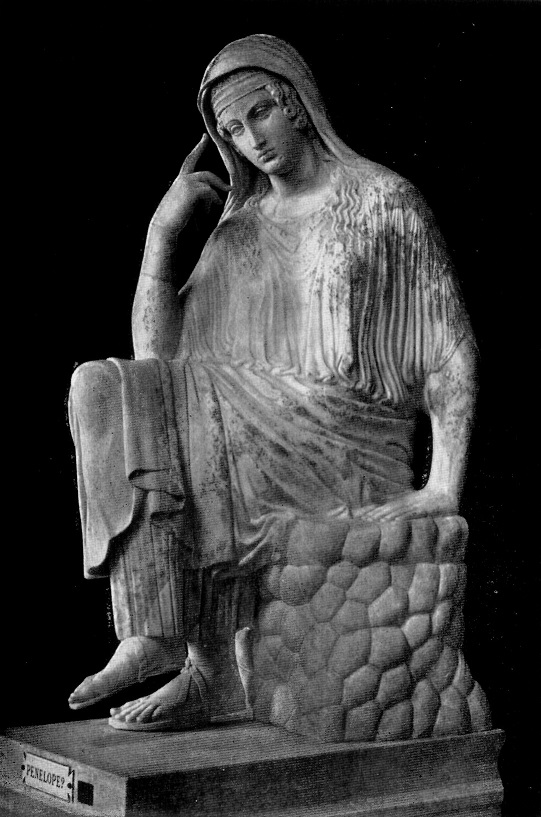
Suitors of Penelope
In Greek mythology, the suitors of Penelope (also known as the Proci) are one of the main subjects of Homer's Odyssey.
Role in the Odyssey
In The Odyssey, Homer describes Odysseus' journey home from the Trojan War. Prior to the Trojan War, Odysseus was King of Ithaca, a Greek island known for its isolation and rugged terrain. When Odysseus departs from Ithaca to fight for the Greeks in the war, he leaves behind a newborn child, Telemachus, and his wife, Penelope.
Although most surviving Greek soldiers return shortly after the end of the fighting, Odysseus does not return to Ithaca until 10 years after the end of the Trojan War.
During Odysseus' long absence, unmarried young men start to suspect that Odysseus died in Troy or on the journey home. Under the pretense of courting Penelope, these youths, called "the suitors", take up residence in Odysseus' home and vie for her hand in marriage. Rather than simply rejecting the suitors, Penelope devises a plan to delay their courtship.
She claims she will choose a husband after she has finished weaving a funeral shroud to present to Odysseus' father, Laertes. For three years, Penelope weaves the shroud during the day and unravels it at night, awaiting her husband's return. The suitors learn of Penelope's delaying tactic when one of her maidservants, Melantho, reveals it to her lover Eurymachus. Upon finding out, the suitors demand that she choose a husband from among them.
The suitors behave badly in Odysseus' home, drinking his wine and eating his food. Odysseus' son, Telemachus, now a young man, is frustrated with the suitors. Telemachus laments to Athena (disguised as Mentes, one of Odysseus' guest-friends) about the suitors' behavior. In return, Athena urges Telemachus to stand up to the suitors and set out in search of his father.
Once Odysseus returns home (whom Athena initially disguises as a beggar so he can plot his revenge in secret), his son Telemachus tells him that there are 108 suitors: 52 from Dulichium, 24 from Same, 20 Achaeans from Zacynthus, and 12 from Ithaca.
Together, Odysseus, Telemachus, Eumaeus and Philoetius kill the suitors and the disloyal maidservants. For reasons of oral presentation (i.e., a memory aid), the suitors are usually listed in the same order throughout the Odyssey.
Important suitors
Although there are many suitors, three are particularly important to the narrative of the epic.
Antinous
Antinous, son of Eupheithes, is the first of the suitors to speak in the epic and the first to die upon Odysseus' return. Antinous is the most disrespectful of the suitors and is the one who devises a plan to murder Telemachus upon his return to Ithaca. Although his plan to murder Telemachus is vetoed by Amphinomus, Antinous continues to behave arrogantly.
When Odysseus finally returns home, disguised as a beggar, Antinous does not show him hospitality and throws a stool at him.
Eurymachus
Eurymachus, son of Polybus, is the second of the suitors to appear in the epic. Eurymachus acts as a leader among the suitors because of his charisma. He is noted to be the most likely to win Penelope's hand because her father and brothers support the union and because he outdoes the other suitors in gift-giving.
Although he is charismatic, Eurymachus is deceitful. He discovers Penelope's plot because he is having an affair with one of Penelope's maidservants, Melantho. Further, when Odysseus reveals himself to the suitors, Eurymachus attempts to avoid punishment for the suitors' misdeeds by blaming them all on Antinous.
Amphinomus
Amphinomus, son of King Nisos, is the most sympathetic of the suitors. Amphinomus attempts twice to dissuade the suitors from murdering Telemachus. Odysseus recognizes this and attempts to warn Amphinomus to leave the home before the final battle. Despite this, Amphinomus stays and dies along with the other suitors.
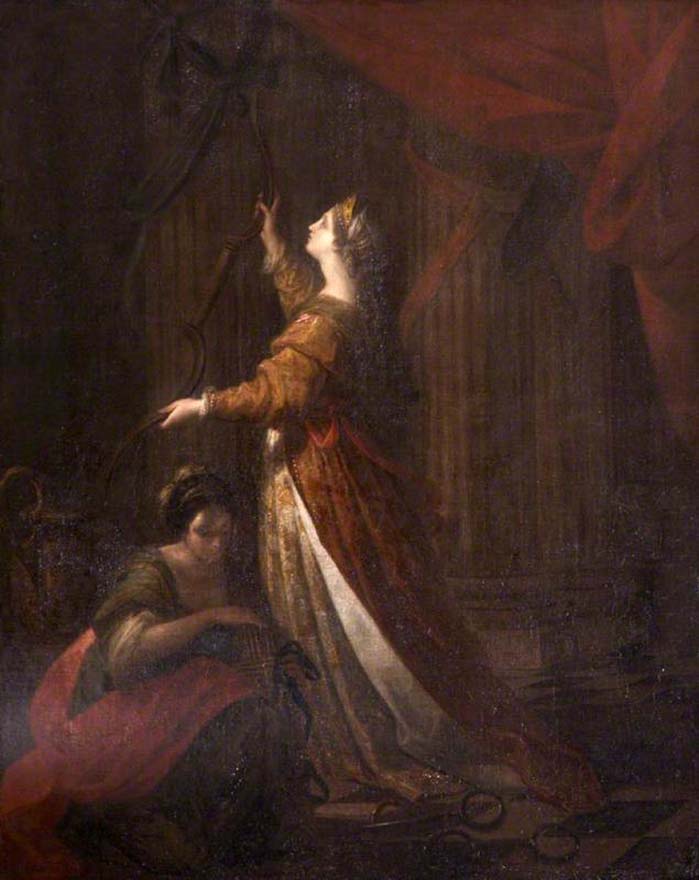
List of suitors
Appearing in the Odyssey
While most of the suitors are not dealt with individually by Homer, some are mentioned by name and play more or less significant roles in the poem. Among them are:
Agelaus, son of Damastor. Killed by Odysseus.
Amphimedon, son of Melaneus. Killed by Telemachus.
Amphinomus. Shows courtesy towards the disguised Odysseus, who warns him against staying; the warning goes unheeded, though, and he is killed along with the other suitors, though by Telemachus and not Odysseus.
Antinous, son of Eupeithes. One of the leaders of the suitors and the first to be killed by Odysseus, he helps instigate the plot to kill Telemachus as he returns from the mainland, and helps spur the fight between Odysseus (as the beggar) and Irus, a notorious beggar.
Ctesippus of Same, son of Polytherses. A "ribald fellow" of great wealth who gives Odysseus, disguised as a beggar, a "present" by throwing a heifer's foot at him; Telemachus threatens him in response, and says that he would have killed him if he had not missed. After killing him, the stockman says that his death is a present in return for the one he gave to Odysseus.
Demoptolemus, killed by Odysseus.
Elatus, killed by Eumaeus.
Euryades, killed by Telemachus.
Eurydamas. Offered a pair of earrings as a gift to Penelope. Eventually killed by Odysseus.
Eurymachus, son of Polybus. One of the leaders of the suitors, noted for being smooth and deceitful. He blames everything on Antinous after he is killed by Odysseus, saying that the suitors are sorry for what they have done and will repay Odysseus. His pleas do not persuade Odysseus, so he tells the suitors they will have to fight if they wish to live, and he is shot with an arrow while charging Odysseus.
Eurynomus, son of Aegyptius. His brother Antiphus accompanied Odysseus to the Trojan War and was devoured by Polyphemus on the way back.
Leiocritus, son of Evenor. Killed by Telemachus.
Leodes, son of Oenops. The sacrificial priest to the suitors, he hates the evil deeds of the suitors and is indignant with the others. While Odysseus is killing the suitors, he begs for mercy, saying that he tried to stop the others and they were paying for not listening to him. Odysseus hears him out, but says that, as a priest, he must have prayed for Odysseus to not come home, so he kills him anyway.
Peisander, son of Polyctor. Offered a necklace as a gift to Penelope. Killed by Philoeteus.
Polybus, son of Polyctor and father of Eurymachus.
Appearing in the Bibliotheca
An extensive list of Penelope's suitors is given in the Bibliotheca. This source does not appear to fully respect the Homeric tradition, as the numbers are different and not all of those named in the Odyssey appear in the Bibliotheca. Due to the text being damaged, some of the names are repeated several times and the lists for Dulichium and Zacynthus actually contain fewer names than the given figures suggest (open the image below in a new tab or enlarge).
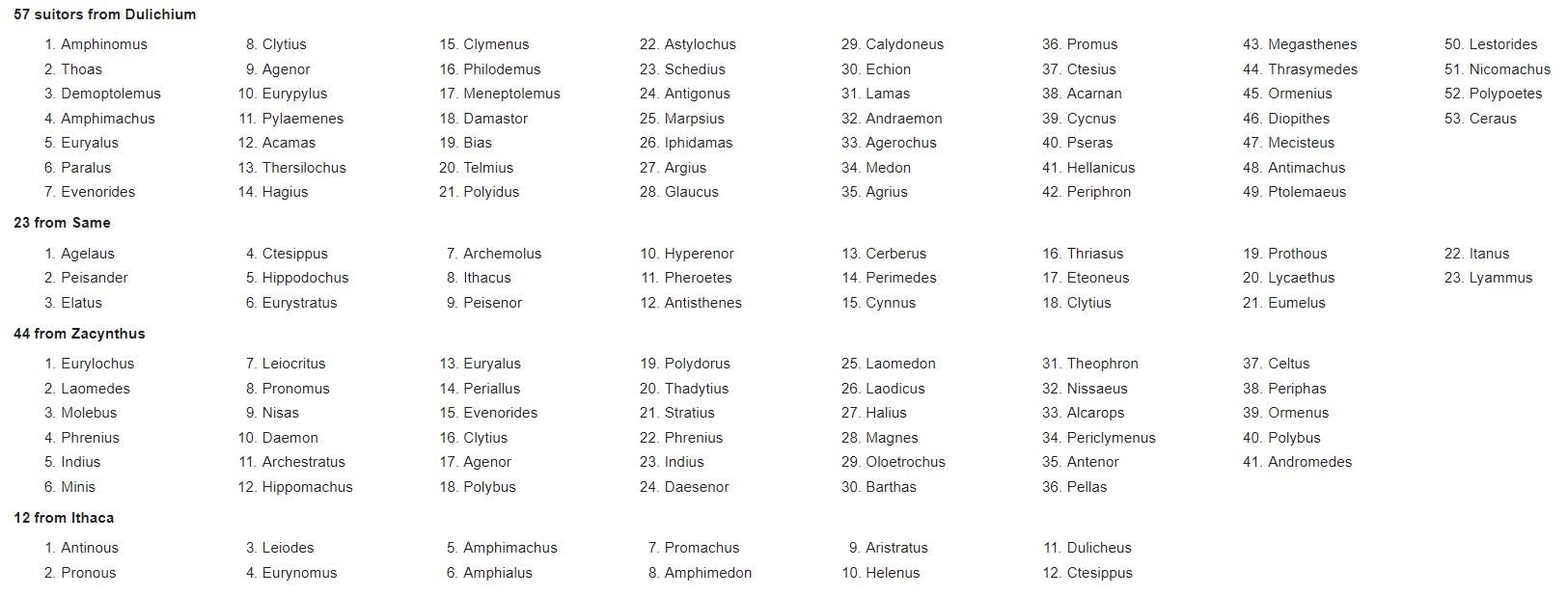
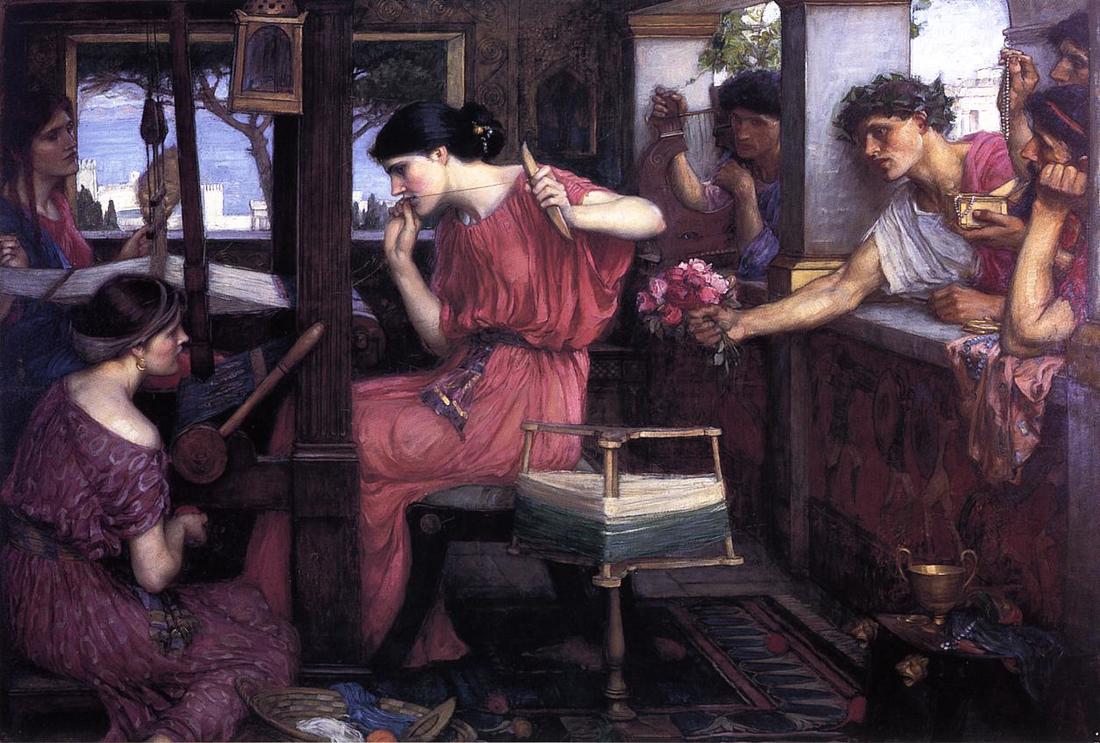
Sources
Homer, Odyssey
Homer, Iliad
Ovid, Heroides I
Lactantius Placidus, Commentarii in Statii Thebaida
The Odyssey, Book XVIII
The Odyssey, Book IV
The Odyssey, 20. 288 ff
The Odyssey, 22. 286 ff
The Odyssey, 22. 226
The Odyssey, 22. 267
The Odyssey, 18. 296
The Odyssey, 22. 283
The Odyssey, 22. 79
The Odyssey, 2. 15 - 22
The Odyssey, 2.242; 22.294
The Odyssey, 21. 144
The Odyssey, 22. 310
The Odyssey, 18. 299
Pseudo-Apollodorus, Bibliotheca, Epitome of Book 4, 7. 26 - 7. 30
Amory, Anne (1963), ‘The reunion of Odysseus and Penelope’, in Charles H. Taylor (ed.) Essays on the Odyssey: Selected Modern Criticism. Bloomington: Indiana University Press, pp. 100–36.
Clayton, Barbara (2004), A Penelopean Poetics: Reweaving the Feminine in Homer’s Odyssey. Lanham, Maryland and Oxford: Lexington Books.
Cohen, Beth (1995, ed.), The Distaff Side: Representing the Female in Homer’s Odyssey. New York and Oxford: Oxford University Press.
Doherty, Lillian E. (1995), Siren Songs: Gender, Audiences, and Narrators in the Odyssey. Ann Arbor: University of Michigan Press.
Felson, Nancy (1994). Regarding Penelope: From Character to Poetics. Princeton, NJ: Princeton University Press.
Finley, M.I. The World of Odysseus, London. Pelican Books (1962).
Hall, Edith (2008), The Return of Ulysses: A Cultural History of Homer’s Odyssey. London and New York: I. B. Tauris.
Heilbrun, Carolyn G. (1991), ‘What was Penelope unweaving?’, in Heilbrun, Hamlet’s Mother and Other Women: Feminist Essays on Literature. London: The Women's Press, pp. 103–11.
Heitman, Richard (2005), Taking her Seriously: Penelope and the Plot of Homer's Odyssey. Ann Arbor: Michigan University Press. ISBN 0-472-11489-1.
Katz, Marylin Arthur (1991), Penelope’s Renown: Meaning and Indeterminacy in the Odyssey. Princeton: Princeton University Press.
Marquardt, Patricia A. (1985), ‘Penelope “ΠΟΛΥΤΡΟΠΟΣ”’, American Journal of Philology 106, 32-48.
Reece, Steve, "Penelope's ‘Early Recognition’ of Odysseus from a Neoanalytic and Oral Perspective," College Literature 38.2 (2011) 101-117.
Roisman, Hanna M. (1987), ‘Penelope’s indignation’, Transactions of the American Philological Association 117, 59-68.
Schein, Seth L. (1996, ed.), Reading the Odyssey: Selected Interpretive Essays. Princeton: Princeton University Press.
Wohl, Victoria Josselyn (1993), ‘Standing by the stathmos: the creation of sexual ideology in the Odyssey’, Arethusa 26, 19-50.
Zeitlin, Froma (1996). 'Figuring fidelity in Homer's Odyssey in Froma Zeitlin, Playing the Other: Gender and Society in Classical Greek Literature. Chicago: University of Chicago Press. pp. 19–52.
Zerba, Michelle (2009), ‘What Penelope knew: doubt and scepticism in the Odyssey’, Classical Quarterly 59, 295-316.
"Wikipedia"
"Greek Mythology Link"


